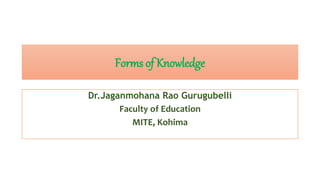
4 knowledge & Experience - forms of knowledge
- 1. Forms of Knowledge Dr.Jaganmohana Rao Gurugubelli Faculty of Education MITE, Kohima
- 2. Knowledge and Experience Knowledge is information and skill acquired through experience or education. Whether it may be the theoretical or practical understanding of a subject. Experience is defined as the knowledge or skill acquired by a period of practical experience of something. Especially that gained in a particular profession. Specialized knowledge includes a range of factual, theoretical and practical knowledge as well as competencies & Skills in a particular discipline or profession.
- 3. Forms of Knowledge: the knowledge Categorisation could be done either on the basis of object of the knowledge or on the basis of level of understanding of the phenomenon. Knowledge can also be classified depending on the purpose and the perspective. Thinkers have classified the knowledge into the knowledge of appearance and the knowledge of essence. John Locke distinguished three kinds of knowledge, These are: 1. Intuitive knowledge, of such things as the fact that red is not green and the fact of one’s own existence; (without conscious reasoning) 2. Demonstrative knowledge, which includes mathematics, morality, and the existence of God; (perceive the agreement or disagreement indirectly through a series of intermediate ideas ) 3. Sensitive knowledge, which is concerned with “the particular existence of finite beings without us.” (relation between Ideas)
- 4. Knowledge, in a practical way, can be classified into following categories on the basis of means used in the process of knowing by which a particular ‘class’ of knowledge is generated. Experiential Knowledge, a form of knowledge that can only be obtained through experience. For example, the knowledge of what it is like to see colours, which cannot be explained to a person born blind. Experimental Knowledge is based on or derived from experience, or empirical evidences. Reasoned or Logical Knowledge is knowledge of the truths and principles of deductive logic. Intuitive Knowledge is the knowledge that is acquired without inference and/or the use of reason. It comes from within by looking inside or contemplation. Revealed Knowledge, certain behaviours, actions, philosophies, people or items are good or bad based upon the authoritative words of some higher power
- 5. Traditional Forms of Knowledge: Traditional knowledge is transmitted orally from generation to generation. It tends to be collectively owned and takes the form of stories, songs, proverbs, cultural values, beliefs, rituals, community laws, local language, and agricultural practices, including the development of plant species and animal breeds. Traditional knowledge is mainly of a practical nature, particularly in such fields as agriculture, fisheries, health, horticulture, forestry and environmental management in general. Cultural Knowledge Artistic Knowledge Medical Knowledge Biodiversity/Natural Knowledge Agricultural Knowledge Sacred Knowledge
- 6. Characteristics of Traditional Knowledge: It is transmitted from generations to generations In many cases, it is transmitted orally for generations from person to person It is being considered by the communities as gift of God and not as a private property Such knowledge typically distinguishes one community from another It is usually impossible to identify the original creator of the information It is learned through continuous observation, experience and practice It is usually associated with the biological resources.
- 7. Modern forms of knowledge: The Modern forms of Knowledge is differ from the Traditional forms of knowledge. It have the more scope to getting knowledge and share among the people. Priori Knowledge: means from before and from earlier, it depends upon what a person can derive from the world without needing to evidence it. (independent of experience, 3+2=5) Posteriori Knowledge: means from what comes later or from what comes after, This is a reference to experience and using different kind of reasoning to gain knowledge. (empirical evidence) Explicit Knowledge: it is similar to priori knowledge in that it is more formal or perhaps more reliable. This type of knowledge is recorded and communicated through mediums. (documents)
- 8. Tacit Knowledge: it is quite opposite of explicit knowledge, it is extremely difficult, if not possible to communicate tacit knowledge through any medium. (it would most closely resemble to posteriori knowledge, as it can only be achieved through experience) Ex: playing piano, riding a bike Propositional Knowledge: this knowledge is not so different from a priori and explicit knowledge. The key attribute is knowing that some thing is true. (Ex: mathematical Equations). It is acquired by more conservative forms of knowledge. Procedural Knowledge: it is differs from propositional knowledge in that it is acquired by doing. Companies that develop their own procedures or methods can protect them as intellectual property. (how to perform a specific skill or task)
- 9. Thank You
